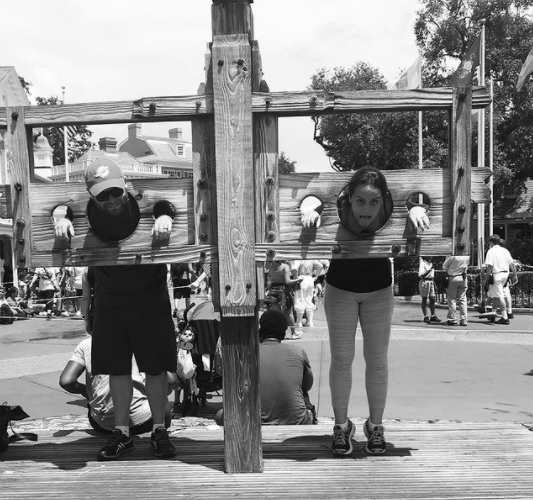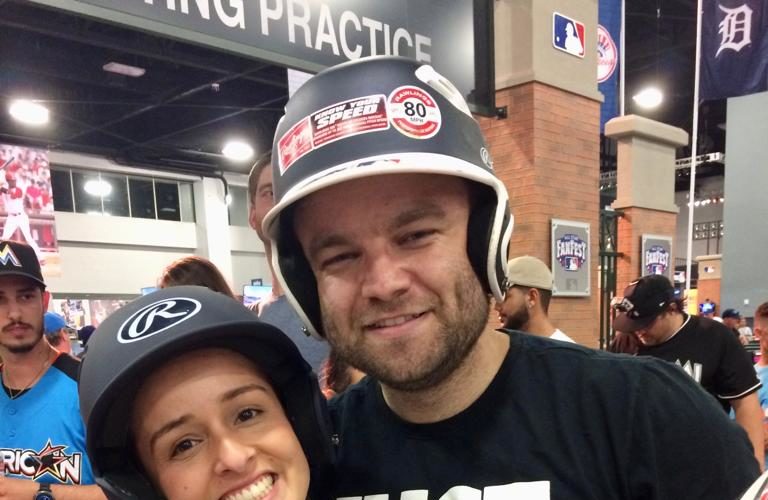head to head: in a race, when two contestants are doing as well as each other.
“They are head to head in the polls.”
(Eles estão empatados nas pesquisas)
off the top of your head: when you give an answer to something without having the time to reflect.
“What’s our market strategy?” “Well, off the top of my head, I can suggest…”
(Bem, de cabeça, eu sugeriria …)
have a good head for: be good at something.
“He’s an accountant and he has a good head for figures.”
(Ele é contador e tem uma cabeça boa pra números)
have your head in the clouds: dream.
“He’s always got his head in the clouds – he makes all these impossible plans.”
(Ele tá sempre com a cabeça nas nuvens)
go over your head: To take up an issue with another person’s boss or other superior rather than beginning or continuing to deal with the original person.
“She went over his head and took her complaint directly to the president of the company.”
(Ela passou por cima dele e foi reclamar direto com o presidente da empresa)
keep your head: stay calm.
“He always keeps his head in a crisis.”
(Ele sempre mantém a calma em momentos de crise)
be head over heels in love: be completely in love.
“You can see that he’s head over heels in love with her.”
(Dá pra ver que ele está super apaixonado por ela)
keep your head above water: manage to survive financially.
“Despite the recession, they kept their heads above water.”
(Apesar da recessão, eles conseguiram sobreviver financeiramente)
use your head: think about something to solve a problem.
“It’s quite simple – just use your head!”
(É muito simples! Use a cabeça!)
Lais Goncalves
Is what you call a minor collision between motor vehicles
Uma fender bender é uma “car cash” (batida de carro), mas você usa fender bender pra esclarecer a gravidade da batida quando você está contando a sua história. E a batida não precisa ser só na frente ou na traseira do carro para ser chamada de ”fender bender.” Qualquer acidente de carro que seja pequeno, sem gravidade (sangue e desmembramento, PT, etc.) é chamado de “fender bender.”
Deixa aí nos comentários em inglês if you have ever been involved in a fender bender.
Bumper-to-bumper é o termo usado em inglês pra quando não há quase nenhum espaço entre um carro e o carro da frente em uma fila de carros. A palavra “bumper” refere-se ao parachoque dos carros, consequentemente, quando um parachoque está quase colado no outro, normalmente por causa de um “traffic jam” (congestionamento), diz-se “the traffic is bumper-to-bumper!” (O trânsito está com um carro colado no outro)
PS: This pic was taken coming back home from Magic Kingdom. Beautiful summer road trip on the Turnpike. Suddenly, the traffic slowed down, then it went into bumper-to-bumper mode, and in less than a couple of minutes, it went from bumper-to-bumper to full-traffic-jam-let’s-just-park-on-the-highway-get-out-of-the-car-have-the-little-kids-play-ball-and-make-bubbles. Super. Creepy. Why? Because the last time I saw something like this, zombies started coming up the road – due to accidents people down the road die first, become zombies, then they come to eat you – and next thing you know, there’s no home to go back to! Well, I guess AMC’s “The Walking Dead” is not that accurate. Three hours went by, the police opened up the highway, traffic started moving and, luckily for all of us, but the eight cars and the truck involved in a tag game (don’t worry! No one seemed to have gotten hurt), there was no zombie apocalypse. 😅
Dica de expressões comuns derivadas do Baseball, um esporte conhecido como “America’s pastime” ⚾️🌭🍺
Curveball – Bola curva. Usada pra expressar eventos inesperados que afetam o curso dos seus planos:
“When everything seems to be working out, life throws you a curveball.” – quando tudo parece estar indo bem a vida te joga uma bola curva/ impõe um obstáculo.
First, Second, and Third base – Primeira, Segunda, e Terceira base. Usadas para expressar o grau de intimidade de um casal antes de chegar nos “finalmentes”. First base = beijo. Second base – amasso/pega aqui, aperta ali. Third base – onde é que foi parar a nossa roupa!? 🙄
“How was your date? Did you get to second base?” “Dude! I didn’t even get to first base! It was totally PG-13!” – “como foi seu encontro? Rolou uns amassos?” “Mano eu não cheguei nem nos beijinhos! Foi super de boa” .
Obs: PG13 se refere a filmes que tem classificação livre, mas que é sugerida a supervisão dos pais para menores de 13 anos. Sendo assim, é utilizada como uma expressão pra descrever algo pouco “assanhado”, mas que poderia ter sido feito/visto até por uma criança.
To hit a home run – chegar nos “finalmentes” – “Did you kiss him?” “I hit a home run” 😈
Ballpark – medida aproximada.
“How many people were there at the concert?” “I don’t know” “just give me the ballpark” “Perhaps about thirty thousand?”.
Big leagues – um grupo importante e bem sucedido.
“You got promoted to director!?!? Wow now you are playing for the big league!”.
Whole (Brand) new ballgame – uma mudança de tática.
“The old plan was working so we had to come up with a whole new ballgame.”
Down to the last out – ter apenas mais uma última chance/ estar próximo ao fim de uma competição.
“You better step up your game because you are down to your last out!”
It ain’t over till it’s over – não acabou até que tenha acabado.
“Omg it’s 7×8! We’re gonna lose the game!” “There’s 5 minutes left! It ain’t over till it’s over!”
It’s like dèja vu all over again (here we go again)- quando uma situação que já aconteceu está prestes a acontecer de novo.
“They broke up, they made up, and now they are fighting? It’s dèja vu all over again.”
To hit it out of the park – alcançar um sucesso espetacular.
“Great job on your report! You hit it out of the park!”
Off base – quando você está errado sobre algo.
“Your arguments would be compelling if your entire premise wasn’t completely off base”.
Rain-check – recusar uma oferta educadamente que poderá ser aceita em outro momento.
“I’ll take a rain check on the party tonight. I have a lot of work to finish right now.”
Right off the bat – imediatamente, logo de cara.
“Right off the bat, I could tell the plan had no chance of success.”
Baseball is a bat-and-ball game played between two teams of nine players each who take turns batting and fielding. The batting team attempts to score runs by hitting a ball (that is thrown by the opposing team’s pitcher) with a bat swung by the batter, and then running counter-clockwise around a series of four bases: first, second, third, and home plate. A run is scored when a player advances around the bases and touches home plate.
Sextou!!! E pra muita gente hoje é dia de festar 💃🏼🤳🏻🍾🍸🎉🎊 ou não! 😴🤓. A intensidade da festança varia de pessoa pra pessoa. Em inglês, algumas maneiras de expressar, no sábado de manhã, o que você fez na sexta à noite são:
If you went out [Se você saiu]:
- I went gallivanting (Eu saí por aí pra dar um rolê, procurando o que fazer, sendo que esse “o que” obviamente refere-se a festas, bares, “curtição”.)
- I went raging (Eu enchi a cara, quebrei tudo, pirei o cabeção!)
- I partied hard (Mesma coisa que “to go raging.”)
- I hit the dance floor (Saí pra dançar)
- I went barhopping (Fui de bar em bar, sendo esse “bar” é o que no Brasil chamamos de “barzinho” não é boteco não ok?)
- I got wasted (Chapei o coco – de álcool ou drogas ou os dois!)
If you stayed in [Se você ficou em casa]:
- I just chilled at home (Fiquei em casa de boa, relaxando)
- I hung out at home (Fiquei em casa fazendo alguma coisa, mas em casa)
- I soaked in the couch (Fiquei de molho no sofá)
- I ordered in (Pedi comida em casa pelo telefone/internet – aqui nos EUA temos UberEats 😁 #lazyaf #praticidade)
- I had take out in my couch (Comprei comida em um restaurante e comi no sofá, a.k.a., no conforto do meu lar)
Mas e aí, last friday did you went out or stayed in?





